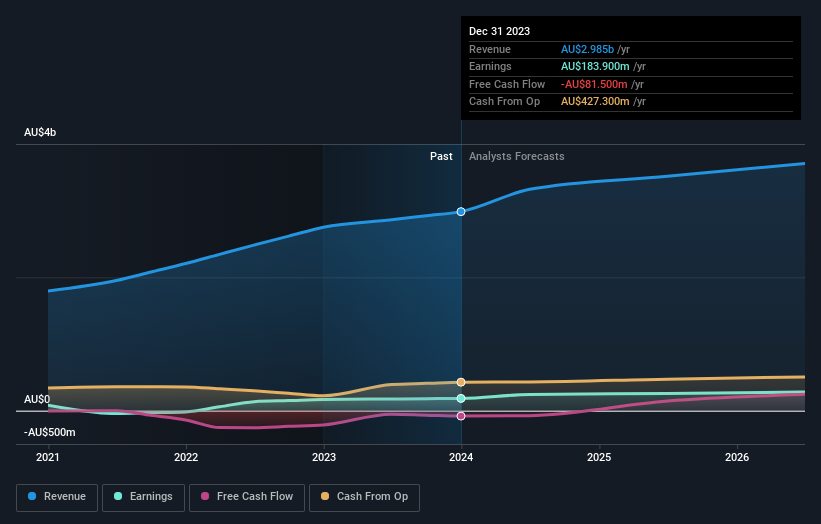Stock Analysis
- Australia
- /
- Infrastructure
- /
- ASX:QUB
Institutional investors have a lot riding on Qube Holdings Limited (ASX:QUB) with 57% ownership

Key Insights
- Given the large stake in the stock by institutions, Qube Holdings' stock price might be vulnerable to their trading decisions
- A total of 11 investors have a majority stake in the company with 50% ownership
- Recent purchases by insiders
Every investor in Qube Holdings Limited (ASX:QUB) should be aware of the most powerful shareholder groups. With 57% stake, institutions possess the maximum shares in the company. That is, the group stands to benefit the most if the stock rises (or lose the most if there is a downturn).
Last week’s 3.4% gain means that institutional investors were on the positive end of the spectrum even as the company has shown strong longer-term trends. One-year return to shareholders is currently 25% and last week’s gain was the icing on the cake.
Let's take a closer look to see what the different types of shareholders can tell us about Qube Holdings.
See our latest analysis for Qube Holdings

What Does The Institutional Ownership Tell Us About Qube Holdings?
Many institutions measure their performance against an index that approximates the local market. So they usually pay more attention to companies that are included in major indices.
Qube Holdings already has institutions on the share registry. Indeed, they own a respectable stake in the company. This suggests some credibility amongst professional investors. But we can't rely on that fact alone since institutions make bad investments sometimes, just like everyone does. When multiple institutions own a stock, there's always a risk that they are in a 'crowded trade'. When such a trade goes wrong, multiple parties may compete to sell stock fast. This risk is higher in a company without a history of growth. You can see Qube Holdings' historic earnings and revenue below, but keep in mind there's always more to the story.

Since institutional investors own more than half the issued stock, the board will likely have to pay attention to their preferences. Hedge funds don't have many shares in Qube Holdings. Challenger Limited is currently the largest shareholder, with 8.2% of shares outstanding. The second and third largest shareholders are Greencape Capital Pty Ltd and State Street Global Advisors, Inc., with an equal amount of shares to their name at 6.0%.
Looking at the shareholder registry, we can see that 50% of the ownership is controlled by the top 11 shareholders, meaning that no single shareholder has a majority interest in the ownership.
While studying institutional ownership for a company can add value to your research, it is also a good practice to research analyst recommendations to get a deeper understand of a stock's expected performance. There are plenty of analysts covering the stock, so it might be worth seeing what they are forecasting, too.
Insider Ownership Of Qube Holdings
The definition of an insider can differ slightly between different countries, but members of the board of directors always count. Management ultimately answers to the board. However, it is not uncommon for managers to be executive board members, especially if they are a founder or the CEO.
Most consider insider ownership a positive because it can indicate the board is well aligned with other shareholders. However, on some occasions too much power is concentrated within this group.
Shareholders would probably be interested to learn that insiders own shares in Qube Holdings Limited. The insiders have a meaningful stake worth AU$114m. Most would see this as a real positive. If you would like to explore the question of insider alignment, you can click here to see if insiders have been buying or selling.
General Public Ownership
The general public-- including retail investors -- own 41% stake in the company, and hence can't easily be ignored. While this group can't necessarily call the shots, it can certainly have a real influence on how the company is run.
Next Steps:
It's always worth thinking about the different groups who own shares in a company. But to understand Qube Holdings better, we need to consider many other factors. Case in point: We've spotted 1 warning sign for Qube Holdings you should be aware of.
If you would prefer discover what analysts are predicting in terms of future growth, do not miss this free report on analyst forecasts.
NB: Figures in this article are calculated using data from the last twelve months, which refer to the 12-month period ending on the last date of the month the financial statement is dated. This may not be consistent with full year annual report figures.
Valuation is complex, but we're helping make it simple.
Find out whether Qube Holdings is potentially over or undervalued by checking out our comprehensive analysis, which includes fair value estimates, risks and warnings, dividends, insider transactions and financial health.
View the Free AnalysisHave feedback on this article? Concerned about the content? Get in touch with us directly. Alternatively, email editorial-team (at) simplywallst.com.
This article by Simply Wall St is general in nature. We provide commentary based on historical data and analyst forecasts only using an unbiased methodology and our articles are not intended to be financial advice. It does not constitute a recommendation to buy or sell any stock, and does not take account of your objectives, or your financial situation. We aim to bring you long-term focused analysis driven by fundamental data. Note that our analysis may not factor in the latest price-sensitive company announcements or qualitative material. Simply Wall St has no position in any stocks mentioned.
About ASX:QUB
Qube Holdings
Provides logistics solutions for import and export supply chain in Australia, New Zealand, and internationally.
Acceptable track record with mediocre balance sheet.

